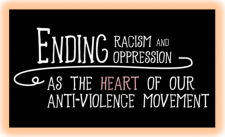Voices From Our Movement: Anti-Racism as Violence Prevention Video Series

Voices from Our Movement: a 3-part video series on ending racism and oppression as the heart of our anti-violence movement
"Across the country, domestic and sexual violence advocates are working to address the ways that racism and oppression impact survivors’ health and self-determination. They are thinking about how history impacts peoples’ lived experience of violence today in our world; they are shifting advocacy practices to better meet the needs of survivors and advocates of color; and they are looking at how the anti-violence movement can resist racism and oppression as one of the most important ways to prevent violence.
Here at the National Health Resource Center on Domestic Violence, we were lucky to sit down with a few of the advocates who are knee deep in this work to learn about their perspectives, stories, and strategies. We have compiled what they have had to share into a short, 3 part, videos series in hopes that it helps others who are also thinking about these intersections.
Video 1: Connecting the Dots: Racism, Oppression, and Work to End Domestic, Sexual, and Intimate Violence
Video 2: Racism in the Anti-Violence Movement: Impacts on Survivors, Advocates, and Communities
Video 3: Transformation is Now: Toward an Integrated, Intersectional Movement
These videos can be watched on your own, or used to spark discussion in a group! We have included sample discussion questions + facilitator’s tips, a glossary of terms, video transcripts, and a small next steps resource guide which can all be found on our website."

